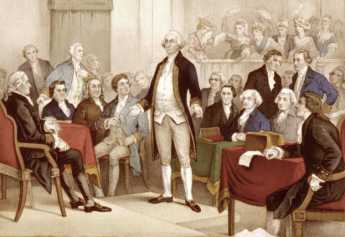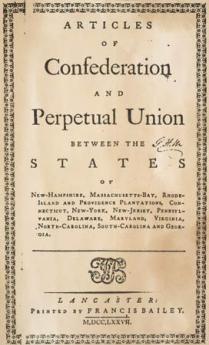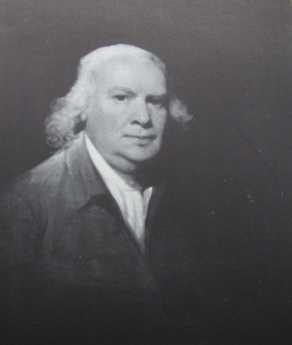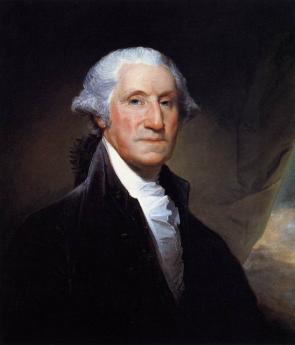Related Topics
Articles of Confederation
The Articles of Confederation were written by John Dickinson, modified by others. Officially unratified for five years, the country was ruled under them in Philadelphia, for thirteen. They taught many lessons, which we sometimes forget we had experienced.
Right Angle Club 2010
2010 is coming to a close, a lame-duck session is upon us, and probably after that will come two years of gridlock. But the Philadelphia Men's Club called the Right Angle, keeps right on talking about the current scene. A few of these current contents relate to speeches given elsewhere.
The Pennamite Wars
The Connecticut farmers believed the King's last word overturned all earlier ones, else why be a king? William Penn's revolutionary idea was that of private property -- the first sale created a new owner, whose new word erased any earlier ones. When you acquire a new continent from aborigines, that's a congenial viewpoint.
Constitution and Civil War
The Thirteenth Amendment abolished slavery (and involuntary servitude, except as punishment for a crime). It was passed by the Senate on April 8, 1864, and by the House on January 31, 1865.
American Articles of Confederation, Valuable or Hindrance?

|
| Continental Congress |
THE British may well have been high-handed with their American colonies, but they were precise while enacting the Prohibitory Act of December 1775 about why they would attack militarily in 1776. Their American subjects had formed a rebel government in 1775 called the Continental Congress, which then dispatched an Army under George Washington to wage war against British forces in Boston; and then showed no signs of disbanding. What could you call that, except an armed mutiny?

|
| Articles of Confederation |
The American colonists naturally had a different viewpoint. Because of the Prohibitory Act of 1775, they needed an established government of some sort to exist if war came, preferring not to be hanged for treason in defense of their rights as British subjects. Their primary grievance, at least at first, was taxation without representation. Many colonists were resistant to more than temporary independence from Britain. The most common goal of American moderates was then a variant of commonwealth similar to what was being discussed for Ireland. Once the British navy actually attacked, however, a strategic document describing what was contemplated for the far future was counter-productive. Strategic discussion bogged down into meaningless disputes between conservatives who wanted a strong central government, and radicals who argued for states' rights, neither of which was sufficiently tactical with British soldiers marauding the land.
To repeat the default position: Fighting the British fleet off Staten Island risked immediate hanging from the yardarm for treason, and the Articles of Confederation served the immediate purpose of legitimizing that. Lawyers may sometimes get lost in their own reasoning, but in this case, the advice was sound. Reconsidering the Articles after the Treaty of Paris was more appropriate, a smokescreen now only useful for confusing an angry British Admiral.
Although John Dickinson produced a workmanlike document in 1777 called the Articles of Confederation, it was weakened and not closely followed; formal ratification drifted during the first four years of the war. The chaotic situation also provided a pretext for some of the colonies to contribute less money or troops than their representatives promised. However, after five years of bloody warfare, an unratified Constitution became increasingly hard to justify, its disadvantages eventually outweighing any argument in favor. Robert Morris also decided the Articles needed to be ratified, as a sign of sufficient unity to justify long-term loans to them.

|
| Robert Morris |
Morris at that time was called the Financier, a poorly defined office which in his aggressive hands meant Morris was effectively running the country. His position put him in the center of unenforceable promises of aid from the thirteen states, justified to him in all the contradictory ways of beleaguered debtors. Morris was enough of a businessman to know that hard-pressed debtors frequently offer weak excuses. So, whether he felt he was thwarting phony evasions, or really believed the states had legal concerns, he pressed ahead vigorously for ratification of the Articles of Confederation. This was soon accomplished in 1781, but unfortunately, it made little difference. It can be safely surmised this experience hardened his long-expressed conviction that every federal government must at a minimum have realistic power to collect taxes to service its debts. But to accomplish that, now required those ratified Articles must be amended or replaced; he had made everything more difficult. It would now be six more years before the "perpetual" Articles could be unraveled, in the form of a new Constitution. That provided for federal taxation and going forward made it considerably easier to amend than by unanimous consent of all the states. There remained the awkwardness of that term "Perpetual". The whole experience was exasperating, but it surely left him and others determined not to be dissuaded by fine points of legal language.

|
| George Washington |
Any perpetual agreement never to allow amendment (except by unanimous consent) is visibly unwise, but that was what confronted those who now proposed to amend the Articles. At the least, it pushed the decision in favor of replacing the whole document. It was easier to brush aside a perpetual legal document, as unreasonable than to argue that obtaining thirteen votes was impossible. George Washington had spent a lifetime constructing a reputation for always keeping his word. If even Washington could agree the situation was unreasonable, the public was of a mind to accept that absolutely anyone should agree. Anyway, the reasoning behind the language in the first place was that thirteen former colonies were joining together for a larger Union which would continue after the Revolution. It was the Union which was meant to be perpetual, not the Articles. Curiously, this change also made it easier to expand the union; imagine the difficulty of obtaining unanimous votes from fifty constituent states. There almost seems to be an ominous political axiom buried in this situation: as the number of voters grows, the majority margin must narrow if a deadlock is to be avoided.
The Revolutionary War, begun in 1775, continued from 1781 (Yorktown) to 1783. Even during four succeeding years of peaceful governance under the Articles, from the Treaty of Paris (1783) to the Constitutional Convention (1787), not a great deal happened. But a few things did come up to test the usefulness of the Articles. The small war between Connecticut and Pennsylvania was settled by the Decision of Trenton, although state boundaries became largely formalities after the country was unified by Article IV of the Constitution. The Northwest Ordinance was passed. And the Constitutional Convention was agreed to. Several flags were tested and adopted. Robert Morris had swept aside the habit of micro-managing the country by Congressional Committee, delegating government departments to bureaucracy in the process. Of all these activities, the most important was the Northwest Ordinance, which demonstrated that important governmental innovations could actually be accomplished under the Articles.
Democracies all like to talk too much. Their constitutions typically run to hundreds of micro-managed pages, and get everyone confused, unless they are unwritten, which is really confusing. It's hard to remember, but the Articles were the first written constitution, and to this day no other former member nation of the British Commonwealth has a written constitution. By giving things a trial run in the Articles of Confederation, we learned what is important and wrote it down. The second time around, tested in war and in peace, we made important revisions. By the time of the Civil War, we had a written governing document that men would die for because they understood it and approved.
Originally published: Thursday, February 09, 2012; most-recently modified: Saturday, July 20, 2019